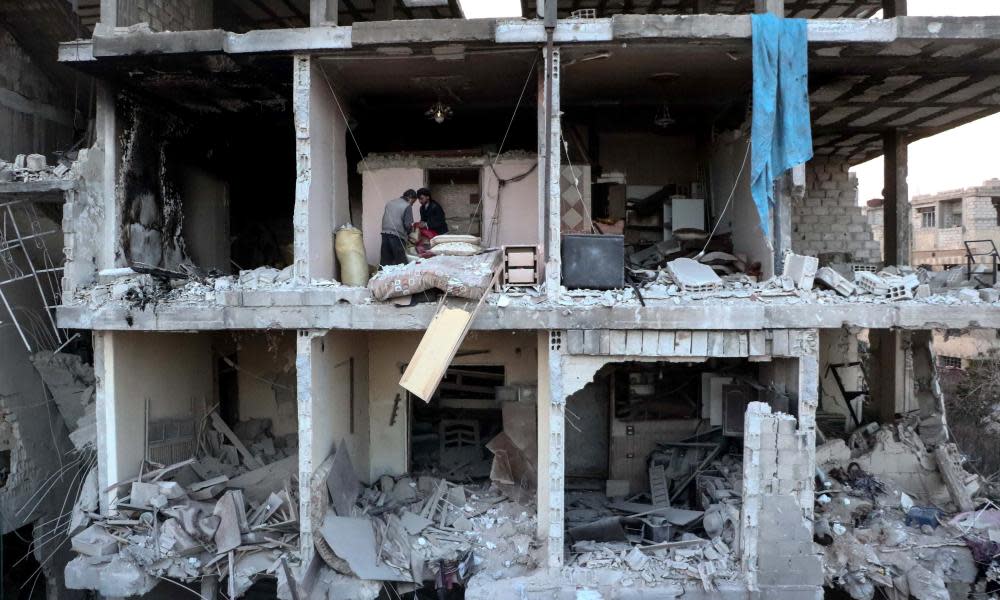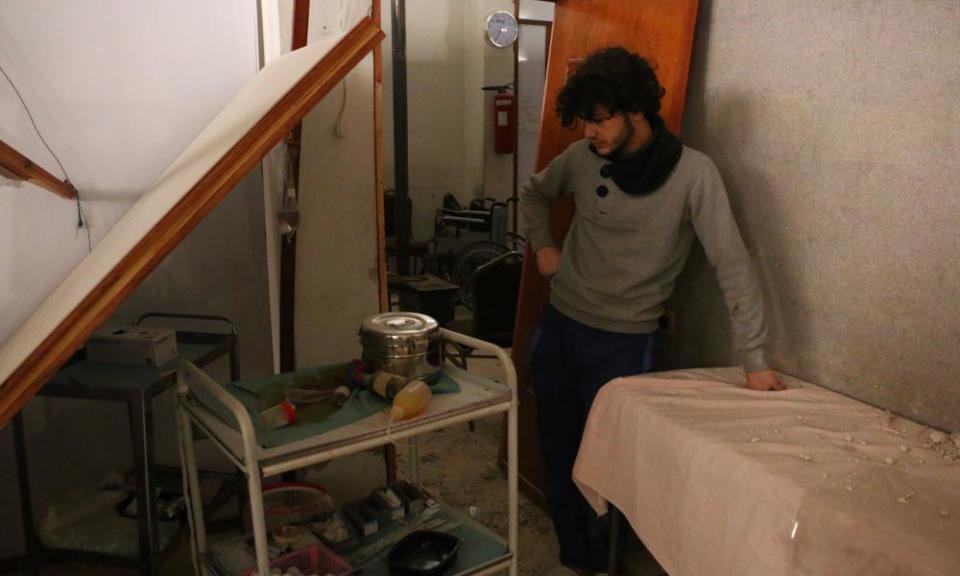Medical crisis in east Ghouta as hospitals 'systematically targeted'

The medical system in eastern Ghouta is near collapse, medics and doctors say, after nearly a week of airstrikes that have hit 22 hospitals and clinics and led to widespread claims that civilian healthcare in the besieged area is being systematically annihilated.
Medics inside Ghouta claimed only three medical facilities remained fully operational and all were overwhelmed with mass casualties that continued to arrive throughout Thursday – the fifth day of a blitz by Russian and Syrian jets across the opposition enclave. Médecins Sans Frontières said 13 hospitals it supported had been destroyed or damaged in the past three days alone.
As the damage and death toll from the strikes continued to mount, international organisations that monitor the Syria crisis alleged there was clear evidence that hospitals were deliberately targeted.
“The unspeakable suffering we are witnessing was deliberately planned and meticulously implemented over time,” said Susannah Sirkin, the director of international policy at Physicians for Human Rights, an NGO. “The current situation is the lethal result of a conscious strategy of besiegement, blocking of aid and, ultimately, the illegal destruction of civilian targets with bombs – a tactic the Syrian government and its allies initiated in Aleppo, and are now repeating with brutality in eastern Ghouta.”
In an effort to address the situation in Ghouta, the United Nations security council will vote on Friday on a draft resolution demanding a 30-day truce in Syria to allow aid deliveries and medical evacuations, but it was not immediately clear if the text had won the support of Syrian ally Russia.
UN Secretary-General Antonio Guterres appealed on Wednesday for an immediate end to “war activities” in Ghouta.
Russia on Thursday proposed amendments to the resolution drafted by Sweden and Kuwait, arguing the language was unrealistic and that the 15-member security council could not simply impose a truce on Syria without consulting the parties.
It was not immediately clear what changes were made to the text. The council is due to vote at 11am (1600 GMT), said Kuwait’s UN mission, president of the council for February.
A resolution needs nine votes in favour and no vetoes by Russia, China, the US, Britain or France. Russia has cast 11 vetoes on possible security council action on Syria since its civil war began in 2011.
Previous attempts at a cessation of hostilities in Syria have quickly unraveled.
Advocacy group the Violations Documentation Centre, which has compiled data on attacks in Syria, said hospitals were being targeted with different munitions to those used elsewhere in Ghouta. “We have observed and documented that the Syrian government targeted the medical points with directed rockets,” said Mona Zeineddine, its director of communications.

“This is important to note because the Syrian regime is largely using unguided and improvised bombs, but when it comes to hospitals and medical points, guided and directed rockets are used. Also when a particular medical site is hit once, it is then hit again when first responders arrive.”
Authorities in Ghouta have also detailed attacks on up to six civil defence centres, which have been used to coordinate rescue attempts. “We are being directly targeted by airplane strikes,” said Abu Saleh al-Ghoutani, an ambulance driver. “Even as we’re rescuing people from under the rubble or driving them to the hospitals we are mercilessly and directly targeted. They wait and see where we’re driving and they bomb us.
“We have 250 documented deaths, and 1,700 injured until Wednesday. The death toll will rise because some are gravely injured.”
According to the Syrian Observatory for Human Rights, a UK-based war monitor, at least 403 people have been killed and 2,116 injured in eastern Ghouta since Sunday night. On Thursday Russia blocked a ceasefire proposal at the UN security council for the area, describing the widespread reporting of heavy civilian casualties as a product of “mass psychosis”.
One Ghouta doctor, who uses the pseudonym Abu Bakr, said: “We’ve been targeted directly. It’s an ungodly situation; we weren’t prepared for this brutality. Civilians did not expect such cruelty. Those who aren’t able to reach shelters are exposed to their deaths. We’re targeted by barrel bombs and all types of rockets. There is scarcity of food and water. We cannot do our jobs properly as well, it’s impossible. Our hands are tied. There is no electricity. We do not know what’s coming in the next few days.”
The sustained air campaign has led to strident criticism from aid agencies, but has generated little diplomatic momentum despite repeated claims that the attacks have constituted war crimes.
Dr Ghanem Tayara, the chairman of the Union Of Medical Care And Relief Organisations, said: “Even war has rules and their actions violate countless UN resolutions. In military battles, even the dead and wounded are allowed to be cleared. The civilians of Ghouta are afforded no such dignity. Their hospitals, schools, food warehouses are destroyed and they are condemned to a slow and painful death.
“Shouldn’t there be an emergency security council meeting to resolve this?,” said Ghoutani. “We’ve had no electricity for four years; children are dying, no milk, no food and no water. The shelters that the families and women and children are hiding in are in terrible conditions; they have no floors, or windows.
“We had one ‘sugar dealer’ who was a pro-regime man, and a kilogram of sugar cost us 17,000 Syrian pounds [£56]. We are now resorting to giving our kids sugary [fluids] as food.”

 Yahoo News
Yahoo News 